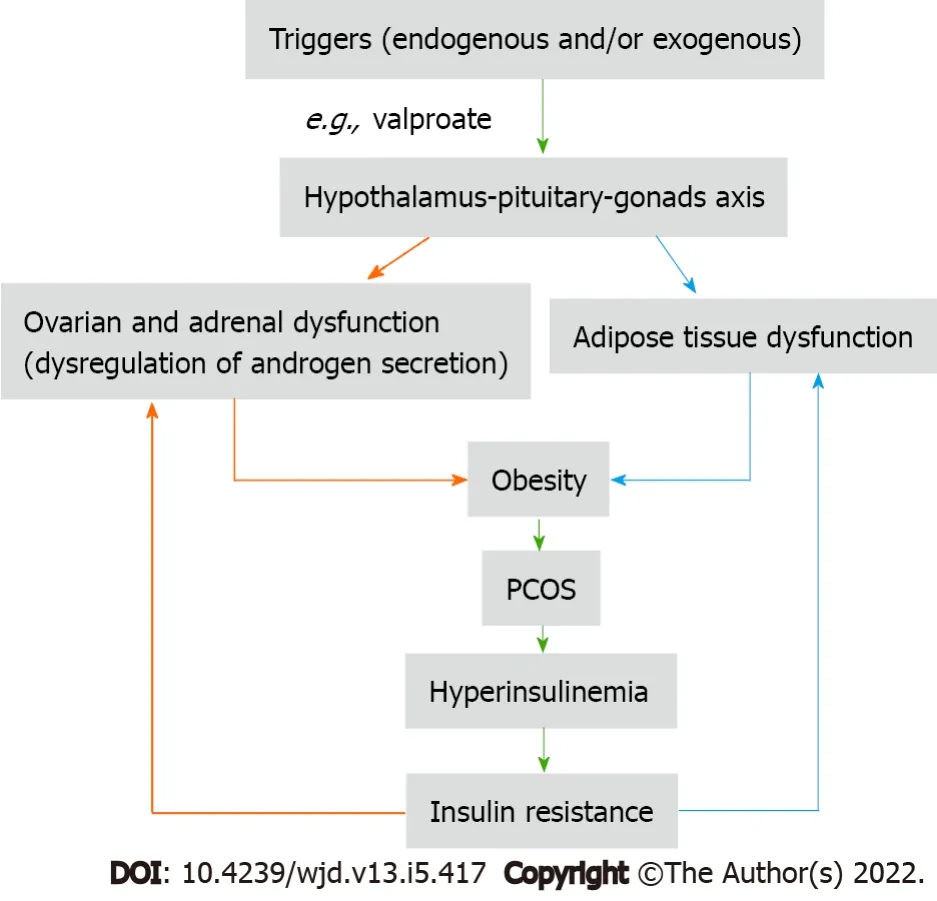Concomitant dysregulation of androgen secretion and dysfunction of adipose tissue induced insulin resistance
2022-05-19MarwanSMAlNimer
TO THE EDITOR
I read with great interest an elegant review by Unluhizarci
[1] who presented the role of insulin in the androgen excess disorders (AEDs) taking polycystic ovary syndrome (PCOS) and idiopathic hirsutism as examples of AEDs. The authors filled the gap about the relationship between hyperandrogenism and hyperinsulinism and they highlighted the following important points: (1) The severity of insulin resistance is related to the phenotype of PCOS; (2) Hyperinsulinemia promotes the ovarian androgen synthesis in a mechanism not related to the gonadotropins; and (3) Using sodium valproate can cause androgen excess and hirsutism. Therefore, according to these important points, it is possible to consider that PCOS is a functional disease of concomitant dysregulation of androgen excess and dysfunction of the adipose tissue which is triggered by exogenous and/or endogenous insult at the hypothalamus-pituitary-target organs (gonads and adrenals)[2,3]. Some authors believe dysregulation of the androgen secretion in the theca cell of the ovary and adrenal gland can produce functional ovarian and adrenal hyperandrogenism, which not necessarily leads to hyperinsulinism and insulin resistance, while dysfunction of the adipose tissue can cause hyperinsulinism and insulin resistance[4]. Therefore, a question has arisen about which factor, trigger substance or event that causes the dysfunction of the theca cells and adipose tissue is still unknown.
So, any therapeutic intervention at the ovarian cell or adipose tissue will ultimately affect the other factor, because each factor potentiates the effect of another factor as Unluhizarci
[1] mentioned in their review (Figure 1). Therefore, the use of insulin sensitizers and/or anti-androgens are of value in ameliorating the biochemical and clinical features of PCOS[5,6], but these medicines, when used as monotherapy, cannot correct hyperandrogenism and hyperinsulinemia at the same time.

Sodium valproate is a modifiable risk factor for the development of PCOS in epileptic and bipolar disorder women by increasing body weight and androgen production[7,8]. In addition, sodium valproate induces hyperinsulinism by having a direct effect on the beta-cell of the pancreas and an indirect effect by suppressing peripheral insulin-glucose uptake[9]. According to the valproate example, PCOS is the result of the vicious cycle (hyperinsulinism-hyperandrogenism) triggered by external or internal modifiable factors which are producing ovarian cell dysfunction. According to the literature, the triggers that cause dysfunction of the ovaries and adrenal glands act on the hypothalamic-pituitarygonadal axis, and this explains why valproate can produce manifestations of PCOS in epileptic and bipolar depressed women. This effect seems to be gender-based because the relationship between insulin resistance and circulating androgens in obese young men is significantly inversed, while in PCOS women is significantly positive, indicating that there is a trigger factor that causes specific dysfunction of ovarian cells[10].
23. By the hand: This is one of the few popular tales in which two siblings81 work together with affection and concern. Another tale is Snow White and Rose Red in which the two sisters are described as often exploring the forest hand in hand.Return to place in story.
The author expressed his appreciation to the author of the article, Dr. Kursad Unluhizarci and his team, Department of Endocrinology, Erciyes University Medical School, Kayseri, Turkey, for doing this type of research.
Al-Nimer MS wrote and revised the letter.
Iraq
Oh! you wicked child, 39 cried the Witch. What is this I hear? I thought I had hidden you safely from the whole world,40 and in spite of it you have managed to deceive me. 41
This article is an open-access article that was selected by an in-house editor and fully peer-reviewed by external reviewers. It is distributed in accordance with the Creative Commons Attribution NonCommercial (CC BYNC 4.0) license, which permits others to distribute, remix, adapt, build upon this work non-commercially, and license their derivative works on different terms, provided the original work is properly cited and the use is noncommercial. See: https://creativecommons.org/Licenses/by-nc/4.0/
The author declares no conflict of interest.
Marwan SM Al-Nimer 0000-0002-5336-3353.
The Queen was well satisfied with the idea, but the armor-bearer, who had overheard everything, being much attached to his young master, went straight to him and revealed the whole plot. I ll soon put a stop to the business, said the tailor. That night he and his wife went to bed at the usual time; and when she thought he had fallen asleep she got up, opened the door, and then lay down again. The little tailor, who had only pretended to be asleep, began to call out in a clear voice: My lad, make that waistcoat and patch those trousers, or I ll box your ears. I have killed seven at a blow, slain two giants, led a unicorn captive, and caught a wild boar, then why should I be afraid of those men standing outside my door? The men, when they heard the tailor saying these words, were so terrified that they fled as if pursued by a wild army, and didn t dare go near him again. So the little tailor was and remained a king all the days of his life.
Wang JJ
One week, he was in very good spirits. This followed several weeks when he was either too ill to come or he had suffered seizures in the car and was forced to miss his lesson with the horses. But that day, he smiled. He seemed alert5 and willing.
Filipodia
Wang JJ
1 Unluhizarci K, Karaca Z, Kelestimur F. Role of insulin and insulin resistance in androgen excess disorders.
2021; 12: 616-629 [PMID: 33995849 DOI: 10.4239/wjd.v12.i5.616]
2 Lim JJ, Lima PDA, Salehi R, Lee DR, Tsang BK. Regulation of androgen receptor signaling by ubiquitination during folliculogenesis and its possible dysregulation in polycystic ovarian syndrome.
2017; 7: 10272 [PMID: 28860512 DOI: 10.1038/s41598-017-09880-0]
3 Macut D, Bjekić-Macut J, Rahelić D, Doknić M. Insulin and the polycystic ovary syndrome.
2017; 130: 163-170 [PMID: 28646699 DOI: 10.1016/j.diabres.2017.06.011]
4 Rosenfield RL, Ehrmann DA. The Pathogenesis of Polycystic Ovary Syndrome (PCOS): The Hypothesis of PCOS as Functional Ovarian Hyperandrogenism Revisited.
2016; 37: 467-520 [PMID: 27459230 DOI:10.1210/er.2015-1104]
5 Gambineri A, Pelusi C, Genghini S, Morselli-Labate AM, Cacciari M, Pagotto U, Pasquali R. Effect of flutamide and metformin administered alone or in combination in dieting obese women with polycystic ovary syndrome.
2004; 60: 241-249 [PMID: 14725687 DOI: 10.1111/j.1365-2265.2004.01973.x]
6 Condorelli RA, Calogero AE, Di Mauro M, Mongioi' LM, Cannarella R, Rosta G, La Vignera S. Androgen excess and metabolic disorders in women with PCOS: beyond the body mass index.
2018; 41: 383-388 [PMID:28942551 DOI: 10.1007/s40618-017-0762-3]
7 Morrell MJ, Isojärvi J, Taylor AE, Dam M, Ayala R, Gomez G, O'Neill F, Tennis P, Messenheimer J. Higher androgens and weight gain with valproate compared with lamotrigine for epilepsy.
2003; 54: 189-199 [PMID: 12837570 DOI: 10.1016/s0920-1211(03)00085-8]
8 Prabhakar S, Sahota P, Kharbanda PS, Siali R, Jain V, Lal V, Khurana D. Sodium valproate, hyperandrogenism and altered ovarian function in Indian women with epilepsy: a prospective study.
2007; 48: 1371-1377 [PMID:17441994 DOI: 10.1111/j.1528-1167.2007.01100.x]
9 Verrotti A, la Torre R, Trotta D, Mohn A, Chiarelli F. Valproate-induced insulin resistance and obesity in children.
2009; 71: 125-131 [PMID: 19188736 DOI: 10.1159/000197868]
10 Kurniawan LB, Adnan E; Windarwati , Mulyono B. Insulin resistance and testosterone level in Indonesian young adult males.
2020; 58: 93-98 [PMID: 32134740 DOI: 10.2478/rjim-2020-0004]
杂志排行
World Journal of Diabetes的其它文章
- Admission hemoglobin level and prognosis of type 2 diabetes mellitus and possible confounding factors: Correspondence
- Changes and significance of retinal blood oxygen saturation and oxidative stress indexes in patients with diabetic retinopathy
- Role of cannabinoids and the endocannabinoid system in modulation of diabetic cardiomyopathy
